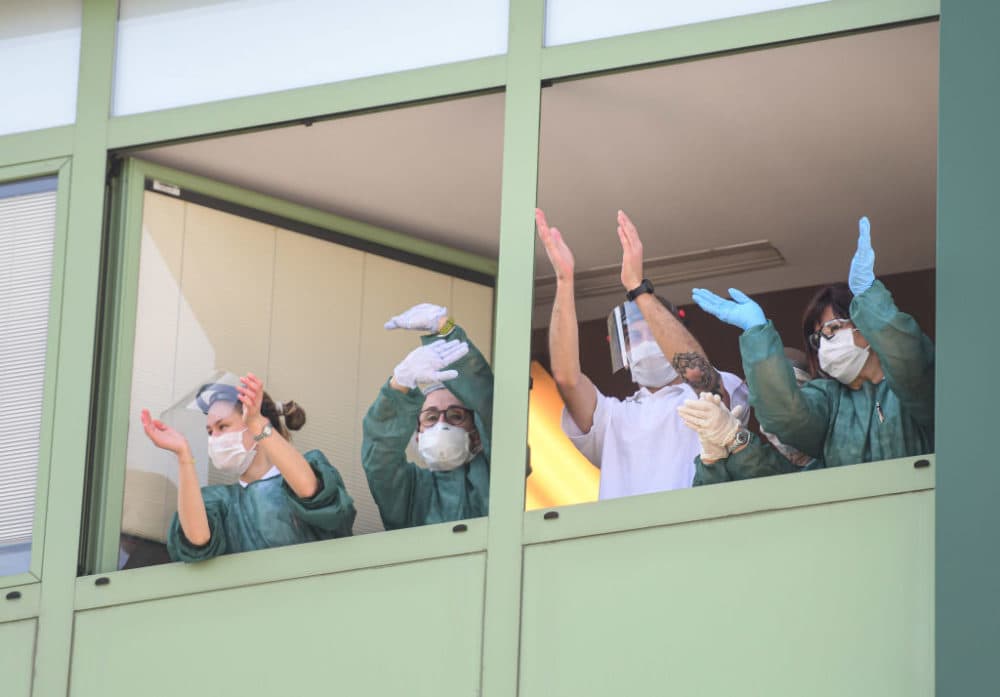Advertisement
As Coronavirus Patients Recover, Hospitals Play Songs Of Hope

When Journey’s “Don’t Stop Believin’” blares over the loudspeakers at Henry Ford Hospital in Detroit, the whole building knows what it means.
It’s the hospital’s clap-out song, played every time a COVID-19 patient recovers enough to go home. On their way out the door, patients are rolled through lines of surrounding hospital staff — doctors, nurses, housekeepers and more — cheering them on as they exit.
The clap-out has become a popular practice across the country. Each hospital has its own ritual, but the songs they play often come from a list of usual suspects. One favorite is “Gonna Fly Now,” better known as the “Rocky” theme, played in hospitals from Hollywood, Florida, to Allentown, Pennsylvania.
Mount Sinai Hospital in Queens was among those hardest-hit early in the pandemic. Over its PA system, hospital staff hear the uplifting Beatles tune “Here Comes the Sun” upon each coronavirus patient’s release. It’s a gentle, persistent reminder that better times are ahead, says Eric Blutinger, an emergency room doctor at the Queens hospital.
“It instills a great sense of hope,” Blutinger says. “Anything it takes to smile just … I love it. I love it.”
Blutinger has made a point to document his experience as a doctor in his first year out of residency working on the front lines of the pandemic. He says the hardest thing is instilling hope in his patients and their families — the very purpose of the clap-out songs.
“Now more than ever seeing how music can heal the pain and inspire people to continue working really hard in the emergency department … it’s just another example of how powerful that particular song and music as a whole can be,” he says.
The ‘80s rock anthem “Don’t Stop Believin’” is another popular choice for hospitals that clap out COVID-19 survivors. But at Henry Ford Hospital and throughout Detroit, patients and hospital staff alike believe the Journey hit is their personal anthem.
“You can’t go to a sporting event or to anything in this area where that song doesn’t come up,” says Patrick Irwin, a proud Detroit native. “Even if you’re not a Journey fan, that’s a line that everybody takes to heart.”
Advertisement
The line Irwin refers to is the song’s mention of a “city boy, born and raised in South Detroit.” The reference has made it a local favorite, played at most large gatherings now canceled because of the pandemic.
Irwin is also the vice president of human resources at Henry Ford Health System. It was his idea to play the song in celebration of coronavirus patients who get discharged from the Detroit hospital. He says he is that city boy, born and raised in south(west) Detroit. He says he chose the song not only because of its message but because of its significance in the community.
“We needed something that would resonate with our team members and patients and really capture who and what we are,” he says. “And it was just the shot in the arm we needed.”
The Detroiter says the song is part of the city’s collective effort to heal. More than 4,000 people have died of the coronavirus in Michigan as of Friday, according to a Johns Hopkins tally. Wayne County, which contains much of Detroit, has the highest concentration of deaths in the state. Many of the victims were part of the black community, putting a great emotional weight on the city’s survivors.
“In those very early days, it was terrifying,” Irwin says. “But this is not a city that takes a punch and lays down. We punch back.”
Despite its high death toll, more than 15,000 Michigan residents have recovered from the coronavirus, and its infection rate is trending downward. Irwin and his colleagues feel they play a part in growing that number.
“I’ll tell you,” he says, “when you see the patients walking through that tunnel, you really feel like you’ve contributed back to humanity.”
Lynsey Jeffery produced and edited this interview for broadcast with Tinku Ray. Jeffery also adapted it for the web.
This segment aired on May 7, 2020.

